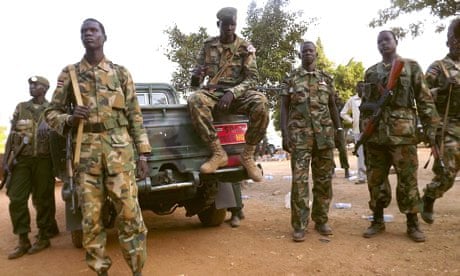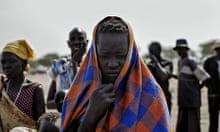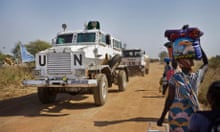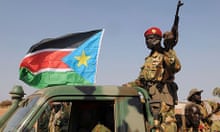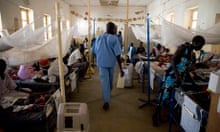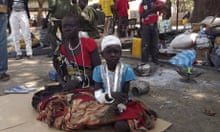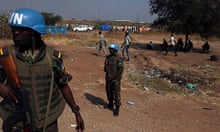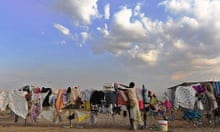Aid agencies have warned of a looming humanitarian catastrophe in South Sudan, where fighting continues in spite of the crisis talks currently under way in neighbouring Ethiopia.
On Thursday, as the government accused rebel forces of forcibly recruiting civilians for their attempt to march on the capital, humanitarian agencies warned that tens of thousands of refugees were without food, water or shelter.
Some 75,000 people have fled to the town of Awerial, having escaped clashes between government and rebel troops 30 miles away in Bor, where the fighting has been fiercest. With more people arriving daily – mostly women and children pouring off boats with only the belongings they could carry – living conditions are near catastrophic, Médecins Sans Frontières (MSF) has warned.
David Nash, head of mission for MSF in South Sudan, had been in Awerial, where he said the situation was chaotic: "Awerial normally has a population of 10,000-12,000 with limited facilities anyway. It has a small health centre, which has been totally overwhelmed. People are camping in the open under trees. Luckily it's not blistering hot during the day, but at night it gets cold. If you're sleeping under a tree without a blanket, you're in trouble."
Clean water is a particular problem, as the town's five boreholes run dry by 10am. "The only real source of water is the Nile, where the banks are not sandy or rocky, more like a muddy bog. People are washing their clothes, bathing: the water quality is dreadful. There are tens of thousands of kids pooping in the open," he said.
MSF and the International Committee of the Red Cross (ICRC) plan to pump water out of the Nile and treat it with chlorine. Other agencies, such as Oxfam, have started to reach Awerial, said Nash, "but there is plenty of room for more".
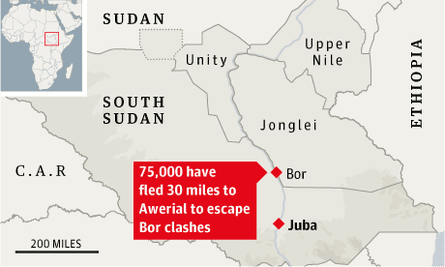
François Moreillon, deputy head of delegation for ICRC, added: "The road to the river is lined with thousands of people, with others waiting for boats to carry them across. This is the largest single identified concentration of displaced people in the country so far."
As humanitarian organisations struggled with the growing numbers of displaced people, the South Sudanese government accused rebels of forcibly recruiting civilians. Rebel militia currently hold Bor, the capital of the key oil-producing state of Jonglei. The military spokesman Colonel Philip Aguer said the government had sent in reinforcements but claimed the rebels were arming reluctant civilians as they focused on their next target – Juba, the seat of the central government.
"Juba, that is their intention," he told the Associated Press. "They are trying to march to Juba. The [military] will return them to where they came from."
James Hoth Mai, the army chief of staff, added: "We are advancing to Bor because these people want to come to Juba. We don't yet have a ceasefire and we don't want them to come and get us."
The fighting has overshadowed efforts in Addis Ababa, which is playing a leading role in trying to end the hostilities. The first direct talks had been expected to start on Wednesday or Thursday in the Ethiopian capital, but were held up by the absence of the government's full delegation while representatives of Riek Machar, the sacked vice-president, western diplomats and mediators waited.
An Ethiopian official told Reuters that negotiations would start with separate meetings between the two sides and the mediator, Seyoum Mesfin, before, it was hoped, proceeding to face-to-face talks.
Both sides have agreed in principle to a ceasefire but neither has indicated when the fighting – which has so far killed more than 1,000 people and displaced nearly 200,000 – will stop. Many have taken refuge in UN peacekeeping bases in Juba and elsewhere in the country.
Salva Kiir, the South Sudanese president, declared a state of emergency on Wednesday in Unity and Jonglei states, where rebels have captured the state capitals. Analysts say control of Bor gives the rebels a strong bargaining chip.
Ethiopia is leading efforts to broker a peace deal in an increasingly ethnic conflict – Kiir is Dinka and Machar is Nuer – that threatens to push the world's newest state into civil war. The power struggle between the two men turned violent in mid-December when Dinka and Nuer soldiers in the presidential guard began fighting each other. Kiir has already ruled out any power-sharing arrangement with Machar in the longer term.
Emma Drew, Oxfam's acting South Sudan director, said it urged all political leaders to work towards a ceasefire: "[We] strongly condemn the use of violent force against civilians, particularly women and children, and request South Sudanese security forces and other armed groups to respect human rights of all its people, regardless of ethnic origin. We call on all parties to protect and respect humanitarian activities."
Justine Greening, the UK's international development secretary,announced on Tuesday that Britain would send emergency healthcare, shelter and other vital supplies for those who have fled their homes. The £12.5m package will provide immediate supplies and support to organisations operating in South Sudan, including the ICRC and UN agencies. The money will go towards tents, emergency medical treatment and clean water. The sum is in addition to the £60m provided by the Department for International Development to South Sudan last year.
